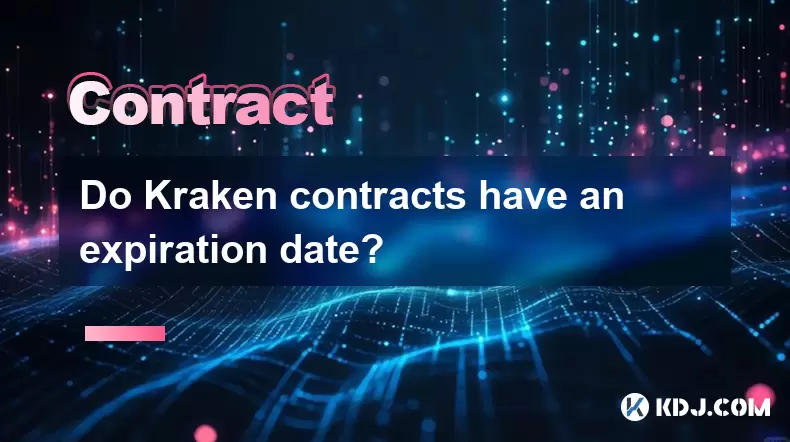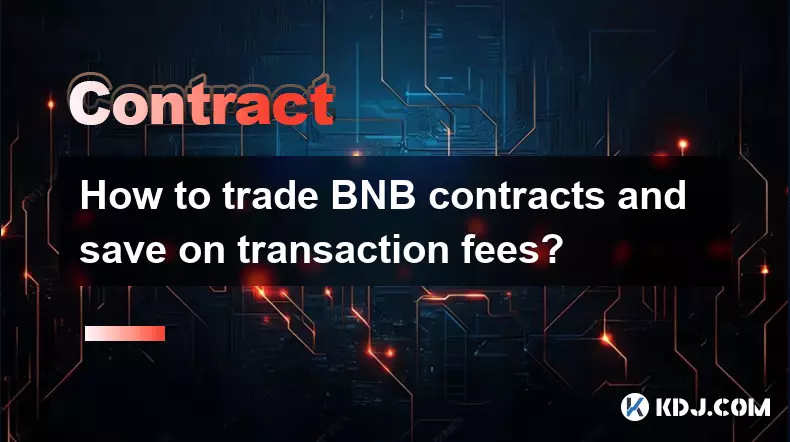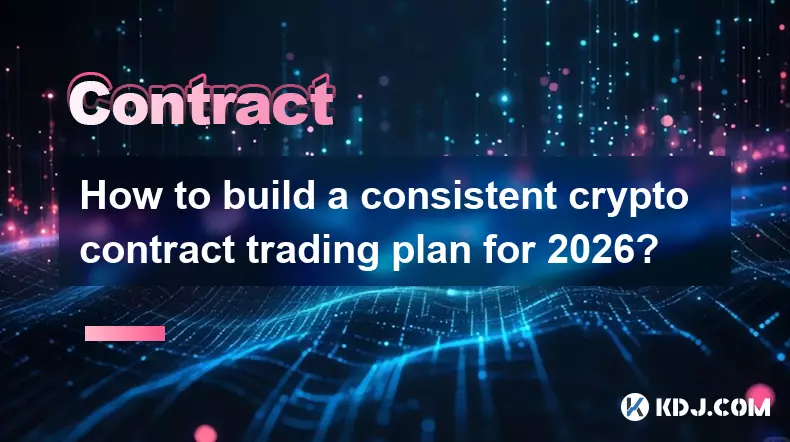-
 bitcoin
bitcoin $87959.907984 USD
1.34% -
 ethereum
ethereum $2920.497338 USD
3.04% -
 tether
tether $0.999775 USD
0.00% -
 xrp
xrp $2.237324 USD
8.12% -
 bnb
bnb $860.243768 USD
0.90% -
 solana
solana $138.089498 USD
5.43% -
 usd-coin
usd-coin $0.999807 USD
0.01% -
 tron
tron $0.272801 USD
-1.53% -
 dogecoin
dogecoin $0.150904 USD
2.96% -
 cardano
cardano $0.421635 USD
1.97% -
 hyperliquid
hyperliquid $32.152445 USD
2.23% -
 bitcoin-cash
bitcoin-cash $533.301069 USD
-1.94% -
 chainlink
chainlink $12.953417 USD
2.68% -
 unus-sed-leo
unus-sed-leo $9.535951 USD
0.73% -
 zcash
zcash $521.483386 USD
-2.87%
Do Kraken contracts have an expiration date?
Kraken Futures offers both perpetual swaps (no expiry) and quarterly futures (fixed expiry), with settlement at 08:00 UTC on the last Friday of each quarter.
Aug 09, 2025 at 11:14 am

Understanding Kraken Contracts and Their Structure
Kraken, a well-established cryptocurrency exchange, offers a variety of financial instruments, including spot trading, margin trading, and futures contracts. When users inquire about whether Kraken contracts have an expiration date, it's essential to distinguish between the different types of contracts available on the platform. The term 'Kraken contracts' typically refers to Kraken Futures, which is the exchange’s dedicated derivatives trading platform. These futures contracts are standardized agreements to buy or sell an asset at a predetermined price at a specified time in the future. Unlike perpetual contracts, futures contracts on Kraken do have an expiration date.
Differentiating Between Perpetual and Quarterly Futures
Kraken Futures provides two primary types of contracts: perpetual swaps and quarterly futures. The key difference lies in their expiration mechanics. Perpetual contracts do not have an expiration date and can be held indefinitely, as long as the trader maintains sufficient margin. These contracts are designed to track the spot price of the underlying asset through a funding rate mechanism. In contrast, quarterly futures contracts have a fixed expiration date, typically set on the last Friday of each quarter. As this date approaches, traders must either close their position, roll it over to the next contract, or allow it to settle automatically.
How to Check Expiration Dates on Kraken Futures
To determine whether a specific contract has an expiration date, traders should navigate to the Kraken Futures trading interface. Once logged in, follow these steps:
- Access the 'Futures' section from the main menu.
- Select the desired trading pair, such as BTC/USD or ETH/USD.
- Observe the contract name displayed above the chart; contracts labeled with a date (e.g., 'BTCUSD.MAR25') indicate a quarterly futures contract with an expiration date.
- Contracts labeled as 'BTCUSD.PERP' are perpetual swaps without an expiration date.The expiration time is usually set at 08:00 UTC on the settlement date. This information is also available in the contract specifications, which can be accessed by clicking the info icon (i) next to the contract name.
Settlement and Delivery Process for Expiring Contracts
When a quarterly futures contract on Kraken reaches its expiration date, it undergoes a mark-to-market settlement process. This means the contract is settled in cash based on the final settlement price, which is calculated using the average spot price of the underlying asset over a defined period before expiration. For example, the BTC quarterly futures contract uses the Bitcoin Reference Rate (BRR), derived from major spot exchanges, averaged over the last hour before 08:00 UTC. Traders holding positions at expiration will see their contracts automatically closed, and any profit or loss will be reflected in their futures wallet balance. No physical delivery of assets occurs; all settlements are cash-based.Managing Positions Before Expiration
Traders holding quarterly futures contracts must decide how to manage their exposure as the expiration date nears. Options include: - Closing the position manually before the settlement time to realize gains or limit losses.
- Rolling the position by closing the expiring contract and opening a new one with a later expiration date, allowing continued market exposure.
- Letting the contract expire, which results in automatic settlement by Kraken.To roll a position:
- Open the futures trading interface.
- Locate the expiring contract and place a limit or market sell order to close it.
- Navigate to the next available contract (e.g., from BTCUSD.MAR25 to BTCUSD.JUN25).
- Place a buy order for the new contract at the desired size.This process ensures continuity in trading strategy without interruption due to expiration.
Impact of Expiration on Leverage and Margin
As a futures contract approaches its expiration date, traders must remain vigilant about margin requirements and leverage settings. While Kraken does not change margin rules based on proximity to expiration, the volatility during the final hours can increase the risk of liquidation. Positions with high leverage are particularly vulnerable. The liquidation engine monitors the margin ratio in real time. If the maintenance margin level is breached, the system will automatically close the position to prevent further losses. Traders can mitigate this risk by reducing leverage, increasing collateral, or closing positions early. It's important to note that funding payments do not apply to quarterly futures, unlike perpetual swaps, so cost of carry is not a factor in holding these contracts to expiry.Frequently Asked Questions
Q: Can I hold a Kraken futures contract past its expiration date? No. Quarterly futures contracts on Kraken are automatically settled at 08:00 UTC on the expiration date. Once settled, the contract ceases to exist, and positions cannot be held beyond this point.Q: How does Kraken determine the settlement price for expired contracts?Kraken uses the Bitcoin Reference Rate (BRR) for BTC contracts and similar composite indices for other assets. The settlement price is calculated as the volume-weighted average price (VWAP) of the underlying asset across major spot exchanges during the final hour before expiration.
Q: Are there fees associated with contract expiration on Kraken?There are no additional fees specifically for expiration. Standard taker and maker fees apply when opening or closing positions. Settlement itself is a fee-free process, but traders should account for potential slippage when closing large positions near expiry.
Q: What happens if I have an open leverage position when a quarterly contract expires?The position will be automatically closed at the final settlement price. Any unrealized profit or loss will be credited or debited from your futures wallet. You do not need to take manual action, but monitoring your position beforehand allows for better control over exit timing.
Disclaimer:info@kdj.com
The information provided is not trading advice. kdj.com does not assume any responsibility for any investments made based on the information provided in this article. Cryptocurrencies are highly volatile and it is highly recommended that you invest with caution after thorough research!
If you believe that the content used on this website infringes your copyright, please contact us immediately (info@kdj.com) and we will delete it promptly.
- Big Apple Bit: Bitcoin's Rebound Hides a Deeper Dive, Say Wave 3 Watchers
- 2026-02-04 07:00:03
- DeFi Vaults Poised for 2026 Boom: Infrastructure Matures, Yield Optimization and Liquidity Preferences Shape the Future
- 2026-02-04 06:50:01
- Royal Canadian Mint Unveils 'Gold Dime' with Astounding High Value, Captivating Collectors
- 2026-02-04 06:55:01
- Datavault AI Dives into Digital Collectibles with Dream Bowl Meme Coin II, Navigating the Wild West of Web3
- 2026-02-04 06:30:02
- New VistaShares ETF Merges Bitcoin and Treasuries for Enhanced Income
- 2026-02-04 06:55:01
- Epstein's Bitcoin Bet: Newly Uncovered Statements Detail Dark Figure's Early Crypto Foray
- 2026-02-04 06:40:02
Related knowledge

How to close a crypto contract position manually or automatically?
Feb 01,2026 at 11:19pm
Manual Position Closure Process1. Log into the trading platform where the contract is active and navigate to the 'Positions' or 'Open Orders' tab. 2. ...

How to understand the impact of Bitcoin ETFs on crypto contracts?
Feb 01,2026 at 04:19pm
Bitcoin ETFs and Market Liquidity1. Bitcoin ETFs introduce institutional capital directly into the spot market, increasing order book depth and reduci...

How to trade DeFi contracts during the current liquidity surge?
Feb 01,2026 at 07:00am
Understanding Liquidity Dynamics in DeFi Protocols1. Liquidity surges in DeFi are often triggered by coordinated capital inflows from yield farming in...

How to use social trading to copy crypto contract experts?
Feb 02,2026 at 07:40am
Understanding Social Trading Platforms1. Social trading platforms integrate real-time market data with user interaction features, enabling traders to ...

How to trade BNB contracts and save on transaction fees?
Feb 03,2026 at 12:39am
Understanding BNB Contract Trading Mechanics1. BNB contracts are derivative instruments traded on Binance Futures, allowing users to gain leveraged ex...

How to build a consistent crypto contract trading plan for 2026?
Feb 02,2026 at 10:59pm
Defining Contract Specifications1. Selecting the underlying asset requires evaluating liquidity depth, historical volatility, and exchange support acr...

How to close a crypto contract position manually or automatically?
Feb 01,2026 at 11:19pm
Manual Position Closure Process1. Log into the trading platform where the contract is active and navigate to the 'Positions' or 'Open Orders' tab. 2. ...

How to understand the impact of Bitcoin ETFs on crypto contracts?
Feb 01,2026 at 04:19pm
Bitcoin ETFs and Market Liquidity1. Bitcoin ETFs introduce institutional capital directly into the spot market, increasing order book depth and reduci...

How to trade DeFi contracts during the current liquidity surge?
Feb 01,2026 at 07:00am
Understanding Liquidity Dynamics in DeFi Protocols1. Liquidity surges in DeFi are often triggered by coordinated capital inflows from yield farming in...

How to use social trading to copy crypto contract experts?
Feb 02,2026 at 07:40am
Understanding Social Trading Platforms1. Social trading platforms integrate real-time market data with user interaction features, enabling traders to ...

How to trade BNB contracts and save on transaction fees?
Feb 03,2026 at 12:39am
Understanding BNB Contract Trading Mechanics1. BNB contracts are derivative instruments traded on Binance Futures, allowing users to gain leveraged ex...

How to build a consistent crypto contract trading plan for 2026?
Feb 02,2026 at 10:59pm
Defining Contract Specifications1. Selecting the underlying asset requires evaluating liquidity depth, historical volatility, and exchange support acr...
See all articles





















![[FULL STORY] My grandfather left me his [FULL STORY] My grandfather left me his](/uploads/2026/02/03/cryptocurrencies-news/videos/origin_6981f669e270a_image_500_375.webp)




















































